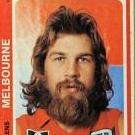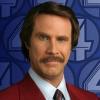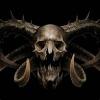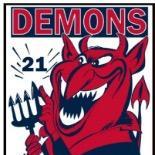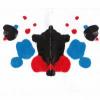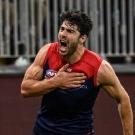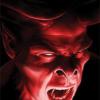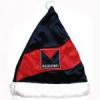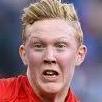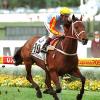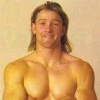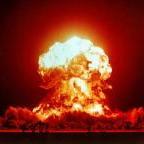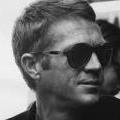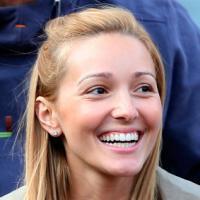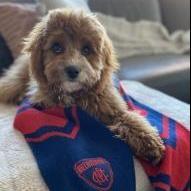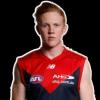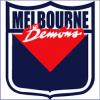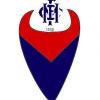Leaderboard
Popular Content
Showing content with the highest reputation on 16/06/12 in all areas
-
I'm inclined to think we would be better off being realistic and chasing the type of players we need the most. We have a few young, tall key position prospects in development at the club and while the likes of Tom McDonald, Lucas Cook, Troy Davis and Jai Sheahan might not compare with Cameron and Patton, you never know what could happen given the right development path. These players are additional to those we already have who can fill key defence and key forward positions. On the other hand, we're dreadful in the midfield, particularly in terms of skilful midfielders who can run, spread and carry. This is the area where I would like to see us concentrate our recruiting resources in the immediate future both in terms of trading and drafting, If we can rebuild our midfield and make it more potent, there will be less pressure on our defence and more good delivery to our forwards. The result will, in my view, be a fairly rapid improvement in the team's fortunes.3 points
-
Gaff was pick 4 in 2010. He will be a great player. Losing a number one draft pick is horrendous - particularly so early into that player's career. However, there's a massive silver lining to this - and its name is Mitch Clark. He's arguably our most important player, and it seems we only had the dough needed to get the Clark deal done as a result of Scully giving us the bird. So, I'm cool with that. I'm happy we got Clark. Scully's happy to be at GWS. And I'm happy the boring little nerd is there too.3 points
-
Any chance Barry took Cook because he thought he'd be a better footballer than Darling in the long run and had nothing to do with the fact that Darling wasn't a "choir boy"? I know it's a radical, out there thought, just putting it out there...3 points
-
Great point ron.Mitch clark is the best player on our list right now IMO and there is no way scully would be our best right now The power forward is alot harder to find then a running mid. Mitch is also a leader of men. After this draft this will end up being the best thing that could have happen for this club. Mitch also has just as much upside as scully once he has some mids who can feed him some great kicks. So IMO we got a power forward who can lead this club back to were it need's to be were as im no so sure scully would have the same impact as BIG MITCH GO DEES2 points
-
Of course we should find out his long term future. After what GW$ did to the MFC all is fair game. The MFC must be relentless in the pursuit of its own gains. It is what other clubs do. To say "we do not have the balls" is an attitude we need to shed. If anything the MFC "balls" need to grow...2 points
-
Sometimes JM your negativity just is so boring. The OP wasn't moaning. Please give the bad ju-ju a rest - it is so tiresome and distracts from the positive stuff you often contribute. Scott Thompson is one of my all time fav players full stop. I loved him at the dees and it was a massive loss when he lost him. I'm really pleased for his success at the crows and wish him more success. But this thread topic was about his chance of winning the brownlow (which i actually think is a great bet and i'll be getting on) not a moan about us losing him (even though jurrachane noted it was a bummer we lost him - which it was!)2 points
-
Here's a thought...try not bitching in every thread you touch. Anyone who has read this site gets your opinion. It has not developed since you began. You do nothing other than state the same repetitive...product...in post after post. Just PM WYL. No-one else needs to see this.2 points
-
Morton frustrates me too, although I think that a couple of posts are reaching 'unfair attack' status, but we have a major problem with the lack of uncontested possessions in this team. Only 6 players average more than 10 a game, and only three of those above 13 a game. Grimes, Jones, and...Morton. Collingwood have 12 players that average more than 10 a game, with Buckley, Shaw, Pendlebury, Didak, Sidebottom, Beams, and Swan all averaging over 13 a game. I used Collingwood as an example to show that it isn't just soft outside players/HBFs that push hard, spread and get uncontested possessions or 'cheap' footy - it is the best players. It is really important.2 points
-
Where have you been, Neeld has tried to instill the defensive side into Cales game this year? We have actually witnessed Cale lay some tackles that stick this year. His pressure on Elliot last weekend in the 3 rd quarter that resulted in him missing the goal. Cale wa the only melbourne player within 30 meteres of him and you say he has no defensive skills. I was trying to make the point that Jones used to get lambasted for turnover over the footy by foot and getting caught running on the spot, but he has slowly been reducing that. I believe that Neeld might by able to slowly smooth over a few of Cales rough edges, which has already started to show. It isn't like switching a switch. Also if average disposal effciency in teh AFL is 60% that means 4 out 10 kicks could be clangers. You get 20 touches that is 8 that won't reach an opponent. this can stand out more for a player that kicks more than he handballs and he gets twice the amount of positions than half the players on his team.2 points
-
2 points
-
His talents are unquestionable and his game last night was awesome. But in 64 games playing as an on-baller this was only the THIRD TIME IN HIS CAREER he's hit 20 touches. And his kicking is iffy. He could become anything but the hype exceeds his output to date IMO.2 points
-
GUN! God I've missed having a big forward, got myself a new favourite player!! Doing Jim proud!!!!2 points
-
The Melbourne Football Club is doing it tough in 2012 and it was only a fortnight ago that a win against Essendon at the MCG averted the possibility of a ten game losing streak to start the season. Whispering Jack has been doing some research and discovered a year when things were much worse so Demonlanders can relax and ponder about a time when ... IT WAS ONLY ... 1919 The VFL competition was less than two decades old when it was partially interrupted by the First World War. The competition, which had expanded to ten teams in 1908 with the introduction of Richmond and University, was reduced to only four in 1916 when the war was at its height but grew back to eight by 1918. Still missing were Melbourne and University. With the end of hostilities in November, 1918 things started to slowly return to normality. Melbourne was re-admitted but the students, whose pre war record in the VFL had been poor, never returned to the senior competition. Feelers were put out for new clubs and applicants included the Ballarat League, Brunswick, Footscray, Hawthorn, North Melbourne, Prahran and Port Melbourne. For the time being, none of the applicants were accepted. A "second XVIII" competition was introduced with the clubs represented by district teams. Melbourne's last appearance in the competition had realised a long-awaited finals appearance in 1915 (it’s first since 1902) but the club had lost players, casualties of war and retirement, while others had lost their prowess after the long break. The club introduced many new players but 1919 was to prove fruitless and Melbourne went through the season finishing last without a win. The shining light was the debut of Ivor Warne Smith who would go on to win two Brownlow Medals and play in the club's second premiership team in 1926. The club appointed George Haines, a champion rover from Geelong, as its playing coach. He made his debut in round 1 against St. Kilda at the Junction Oval, along with seven others who were playing their first VFL games. Haines, who had changed his name from Heinz because of the anti-German feeling of the day, captain-coached the side in 1919 and remained as a player in the following season. Among those from the club who joined the ranks of the fallen during wartime were respected defender Arthur Mueller "Joe" Pearce who was killed during the landing at Gallipoli. Others who lost their lives were Clifford Burge, Jack Doubleday, Desmond McDonald, Fenley McDonald, Ralph Robertson, Percy Rodriguez and Alfred Williamson. The club was left with an inexperienced line up that was hardly a match for the opposition clubs and, despite some gallant efforts, the Redlegs had to wait until the following season to record the first post war victory after returning to the fold in May of 1919. Round 1, 1919 - St. Kilda v Melbourne Saturday, 3 May, 1919 at Junction Oval, St. Kilda. St. Kilda 3.5.23 7.8.50 9.12.66 12.14.86 Melbourne 2.0.12 3.1.19 4.2.26 9.4.58 Goal kickers George Haines 3, Jack Huntington 2, Gordon Coulter 1, Teddy Johnston 1, Herb Matthews 1, Eric Tonkin 1 St. Kilda took the lead early and by half time led by 31 points. The Saints stretched the lead to 40 points at the last break but Melbourne reduced the deficit by two goals in a final term in which it more than doubled its score. Making their debuts along with Haines who suffered a shoulder injury were Gordon Coulter, Jack House, Con Kenney, Bob Love, Percy Love, John McMahon and Eric Tonkin. Bill McKenzie completed a long wait to play his 100th game and ruckman Bill Allan was Melbourne's best. Round 2, 1919 - Melbourne v South Melbourne Saturday, 10 May, 1919 at MCG Melbourne 0.2.2 2.5.17 3.7.25 3.10.28 South Melbourne 3.7.25 5.10.40 7.13.55 10.19.79 Goal kickers George Haines 1, Percy Love 1, Eric Tonkin 1 Melbourne's return to the MCG was greeted by a crowd of 6,237 in its game against reigning premier South Melbourne who the Fuschias had nudged out of a finals place four years earlier. They had to wait until the second quarter before they would kick their first goal of the new era at their home ground and were soundly thrashed. Still hampered by his shoulder injury, Haines barely made a contribution after the first term. His team's disposal skills were poor, it overused its handball and scored only one goal after half time in a 51 point loss. Allan, McKenzie and Percy Love were the best in a game in which the club introduced another debutant in Cyril Hall. Round 3, 1919 - Melbourne v Richmond Saturday, 17 May, 1919 at MCG Melbourne 2.1.13 4.4.28 4.6.30 7.7.49 Richmond 3.4.22 4.9.33 9.10.64 11.14.80 Goal kickers Eric Tonkin 2, Jack Connole 1, George Haines 1, Jack Huntington 1, Con Kenney 1, Percy Love 1 There were signs of improvement as Melbourne trailed by a mere five points at half time. At that stage, most players were holding their own around the ground but the usually reliable Allan was well beaten in the ruck. The third quarter was a disaster with Richmond piling on 5.1 to 0.2 which was virtually the difference between the teams on the day. McKenzie, Hall and midfielder House were the team's best. Haines returned to form in his roving role and there was some respite ahead for the team with a bye scheduled for the coming weekend. Round 4, 1919 - bye Round 5, 1919 - Carlton v Melbourne Saturday, 31 May at Princes Park, Parkville Carlton 2.2.14 9.4.58 14.8.92 18.15.123 Melbourne 1.3.9 2.4.16 3.4.22 5.4.34 Goal kickers Eric Tonkin 2, Jack Huntington 1, Bob Love 1, Bill McKenzie 1 The week's break proved to be of little value to the team which was thrashed by Carlton after a competitive first quarter. The Blues were relentless for the remainder of the game and it was only due to their forwards failing to hit the target in the final term that the Redlegs managed to avoid a defeat in excess of 100 points. Tonkin was Melbourne's best, and both Haines and McLean won praise in a disappointing performance. Elsewhere that day, Geelong finished goalless, kicking 18 points against St. Kilda. Round 6, 1919 - Collingwood v Melbourne Saturday, 7 June, 1919 at Victoria Park, Abbotsford Collingwood 3.5.23 8.12.60 11.14.80 16.20.116 Melbourne 2.0.12 3.1.19 7.6.48 8.7.55 Goal kickers Eric Tonkin 2, Bill Allen 1, Jack Connole 1, George Haines 1, Jack House 1, Percy Love 1, Alex Salvado 1 The comeback kids were quickly becoming the whipping boys of the competition although one might have thought otherwise when the players received notice in the rooms at Victoria Park for their game against Collingwood that said "The secretary respectfully requests the players to kick as many goals as possible, but those kicking more than six goals will be ordered off the field for selfishness". Needless to say there was no "selfishness" and the team went down by ten goals. There were however, some signs of improvement but there was little teamwork and Collingwood was simply a much stronger outfit. George Walker was Melbourne's best and Gray was applauded for his kick-ins which often cleared his side out of danger. McKenzie and House were also among the best. Round 7, 1919 - Melbourne v Fitzroy Saturday, 14 June, 1919 at MCG Melbourne 3.2.20 3.5.23 4.6.30 6.6.42 Fitzroy 5.2.32 6.8.44 9.11.65 11.12.78 Goal kickers George Haines 3, Bill Allen 1, Stan Huntington 1, Con Kenney 1 The desperate Redlegs introduced three new players for the game against Fitzroy (one of who just lasted the one game) but it made little difference as the onslaught continued in front of 4,085 fans at the MCG. The Melbourne forward line struggled to score goals while the Maroons' focal point, Bob Merrick kicked eight of their 11 goals. The indefatigable Bill Allen was back to his best in the ruck in his 100th game. Other good players were Baquie, Matthews, Haines, Walker and Lilley. Round 8, 1919 - Melbourne v Geelong Saturday, 21 June at MCG Melbourne 3.2.20 3.3.21 7.6.48 7.10.52 Geelong 1.1.7 6.7.43 8.10.58 10.12.72 Goal kickers Eric Tonkin 2, Bill Allen 1, Stan Huntington 1, Percy Love 1, Herb Matthews 1, Bill McKenzie 1 A truly paltry crowd (even by the standards of the day) of 1,327 came to the MCG to watch the competition's cellar dwellers as eight fought for the right to claim their first premiership points of the season. The Redlegs started the campaign well with the aid of the breeze but were swamped in the second term and eventually lost a lacklustre game by 20 points. Eric Tonkin arrived early in the afternoon after catching a train overnight from Sydney and he had a good game kicking two goals. Debutant Leo Little who had previously played VFL football for the now disbanded University team in 1915 was promising. Round 9, 1919 - Essendon v Melbourne Saturday, 28 June at East Melbourne Essendon 4.3.27 7.10.52 11.14.80 16.17.113 Melbourne 2.2.14 3.3.21 5.6.36 6.8.44 Goal kickers George Haines 1, Jack Huntington 1, Gordon Landy 1, Herb Matthews 1, Alex Salvado 1, Eric Tonkin 1 Essendon's home ground was at nearby East Melbourne and Melbourne, with three more newcomers in the team suffered their biggest defeat at the venue. Ex-Carlton recruit Bill Hore was among the best along with Gray and Haines but the hapless Redlegs were never in the hunt after the first quarter. Round 10, 1919 – Melbourne v St. Kilda Saturday 12 July, 1919 at MCG Melbourne 3.2.20 5.3.33 5.4.34 5.7.37 St. Kilda 2.2.14 3.6.24 5.11.41 6.11.47 Goal kickers Eric Tonkin 2, Jack Baquie 1, George Haines 1, Ivor Warne-Smith 1 The round 10 fixture against St. Kilda was played before a small crowd of 3,483 but was significant on two counts. The home side came closer than ever before of winning it's first game since 1915 and, more significantly, the game marked the debut of Ivor Warne-Smith, arguably one of the greatest Demons ever to grace the football fields. The twenty-one year old Warne-Smith joined Melbourne for eight games and two goals in 1919 but moved to Tasmania in the following year. The true all round sportsman returned to the club in 1925 and had a stellar season in 1926 playing in a premiership and winning the Brownlow Medal, a feat he repeated in 1928. He retired at the end of 1932 by which time he had captain coached the team. Warne-Smith played 146 games for 110 goals. Later in life, he was Chairman of Selectors, helping Norm Smith to create the revived Demons as they began their golden era of the 1950s and 60s. Warne-Smith's debut game was played in blinding rain with strong winds that made play difficult. The conditions helped the home side which found itself in unfamiliar territory when it led by 9 points at half time. However, the Saints dominated the third term to take a seven point lead into the last, and while Melbourne had its opportunities to snatch victory kicking with the wind in the final quarter, it couldn't add to it's half time tally of goals while the visitors goalled at one of their few forward forays to win by 10 points. According to a report in the Football Record, it was so cold that the St Kilda players could not untie their bootlaces or take off their uniforms unaided after the match. For Melbourne, Gray and Armstrong were best while Haines and debutant Warne-Smith impressed. Round 11, 1919 - South Melbourne v Melbourne Saturday, 19 July, 1919 at Lake Oval, Albert Park South Melbourne 2.3.15 6.7.43 9.10.64 13.16.94 Melbourne 0.1.1 1.7.13 1.9.15 2.15.27 Goal kickers Herb Matthews 1, Lou Salvana 1 Harry Brereton was a Melbourne champion who kicked 187 goals in his 85 games between 1909 and 1915 and was the VFL's top goal kicket in 1912 but in his first game since the start of World War 1, he lined up against his former teammates and destroyed them with a six goal haul for South Melbourne. The Swans were dominant all day, leading by five goals at the main break and stretching that out to a 67 point win. Little, McKenzie, Walker and Matthews were best for the Fuschias who had now lost all 10 matches of what was turning into a horror season. Round 12, 1919 - Richmond v Melbourne Saturday, 26 July, 1919 at Punt Road, Richmond Richmond 2.6.18 2.10.22 5.15.45 9.18.72 Melbourne 2.0.12 5.3.33 6.3.39 7.6.48 Goal kickers Alec Farrow 2, Archie Grigg 1, George Haines 1, Charlie Lilley 1, Bill Shelton 1, Ivor Warne-Smith 1 The club was desperate to turn things around and added four more first gamers into the mix for their round 12 clash against the neighbouring Tigers. The move seemed to be an inspired one when the team led by eleven points at half time but Richmond turned things around with 3.3.21 to 0.4.4 for the third term and ran away with the game in the last to record a comfortable victory. The following week's bye could not come quickly enough. Melbourne's best were McKenzie, Shelton, Walker and Matthews. Round 13, 1919 - bye Round 14, 1919 - Melbourne v Carlton Saturday, 16 August, 1919 at MCG Melbourne 0.3.3 0.3.3 3.6.24 5.6.36 Carlton 2.2.14 9.6.60 12.10.82 13.18.96 Goal kickers Lou Salvana 2, Gordon Coulter 1, Con Kenney 1, Herb Matthews 1 Only 3,825 fans were in attendance at the MCG to witness another drubbing, this time at the hands of the Blues who kept the Fuschias goalless for the first half to lead by 57 points at the main interval. With the game decided, the second half was an even tussle with Melbourne going down by 10 goals. Jack Baquie was his team's best along with McKenzie, Boddington and Shelton while McWhinney, Matthews and Warne-Smith also won praise. Round 15, 1919 - Melbourne v Collingwood Saturday, 23 August, 1919 at MCG Melbourne 2.0.12 2.1.13 3.3.21 5.6.36 Collingwood 4.4.28 9.12.66 12.24.96 20.25.145 Goal kickers Con Kenney 2, Percy Love 1, Herb Matthews 1, Eric Tonkin 1 The Magpies were in form and heading towards a top of the ladder finish while the Redlegs were winless. The resulting thrashing was inevitable although few would have predicted how badly things would go for Melbourne. In front of a crowd of 3,885, the team crashed to a 109 point defeat which flattered the team because of Collingwood's inaccuracy in front of goal. Nevertheless, the Magpies' score of 20.25.145 was their highest score ever. Unfortunately for Melbourne, the team had yet to reach rock bottom. Round 16, 1919 - Fitzroy v Melbourne Saturday, 30 August at Brunswick Street, Fitzroy Fitzroy 6.5.41 14.7.91 19.12.126 21.16.142 Melbourne 1.2.8 1.2.8 2.3.15 2.5.17 Goal kickers Eric Chisholm 1, George Haines 1 Melbourne suffered it's biggest loss ever at Brunswick Street in a non-competitive display that yielded it a mere two goals for the day. The Maroons, with Bob Merrick kicking 12 goals (at that stage, the second biggest goal haul in VFL history) finished 125 point winners while the hapless Fuschias booted their lowest score since they kicked 0.8 against South Melbourne in 1912. Round 17, 1919 - Geelong vs Melbourne Saturday, 6 September, 1919 at Corio Oval, Geelong Geelong 5.3.33 5.4.34 9.12.66 14.12.96 Melbourne 0.3.3 1.10.16 2.10.22 6.15.51 Goal kickers Harry Selover 2, Bill Allen 1, George Haines 1, Stan Huntington 1, Leo Little 1 George Haines celebrated his 100th game with an improved performance after a poor opening quarter at Corio Oval against the Pivotonians. Indeed, the half time deficit of three goals could have been much closer had the visitors kicked better than 1.7 to 0.1 in the second term. Geelong proved too strong in the second half to run out 45 point winners. Tonkin, Haines, Allen and Selover were Melbourne's best. Round 18, 1919 - Melbourne vs Essendon Saturday, 13 September, 1919 at MCG Melbourne 1.4.10 1.4.10 2.5.17 4.9.33 Essendon 0.3.3 5.5.35 8.5.53 10.7.67 Goal kickers Eric Chisholm 1, George Haines 1, Jack Huntington 1, Percy Love 1 Melbourne's hopes of ending the season with victory was boosted when it held Essendon goalless in the opening term of their final game. However, the Redlegs failed to score in the second quarter and were four goals in arrears by half time on the way to a 34 point defeat. After a long an arduous season, it was clear that some of the players were already in end of season mode even before the game had started. Legend had it that three of them went for a "long lunch" before the match. One broke a window in a cab on the way to the ground and the three were locked inside until suitable compensation was offered. They did manage to make it in time for the game and be named amongst the best three players! At season's end, this was the ladder:- Team W D L % Pts Collingwood 13 0 3 162.3 52 South Melbourne 12 0 4 158.7 48 Carlton 10 0 6 127.6 40 Richmond 10 0 6 118.2 40 ------------------------------------------------- Fitzroy 9 1 6 125.3 38 Essendon 7 0 9 94.6 28 St. Kilda 7 0 9 70.6 28 Geelong 3 1 12 73.4 14 Melbourne 0 0 16 43.0 0 Collingwood went on to win the premiership after beating Richmond in the grand final. Playing List - 1919 Number Player Games Goals 1 Bill Allen 9 4 2 Eric Tonkin 14 14 3 Percy Love 11 6 4 Bill McKenzie 13 2 5 Bob Love 8 1 6 Herb Matthews 14 6 7 Bill Hore 2 0 7 Reg Gibb 3 0 8 Charlie Lilley 14 1 9 John McMahon 3 0 10 Gordon Coulter 8 2 11 Jack Baquie 14 1 13 Lindsay Nichols 1 0 14 Alec Gray 13 0 15 George Haines 14 15 16 George Walker 10 0 17 Con Kenney 9 5 18 Bob Bodington 4 0 18 Stan Huntington 3 3 19 Eric Chisholm 5 2 19 Allan McLean 5 0 19 Jack Huntington 12 6 20 Art McWhinney 9 0 20 Teddy Johnston 1 1 21 Jack House 15 1 22 Bill Brunier 4 0 23 Alex Salvado 5 2 24 Lou Salvana 6 3 25 Alec Farrow 4 2 25 Howard Richardson 1 0 26 Cyril Hall 9 0 27 Jack Connole 5 2 28 Matt Connors 3 0 28 Jack Evans 1 0 29 Charlie Armstrong 3 0 29 Frank Cummins 1 0 30 Bill Shelton 8 1 31 Leo Little 6 1 32 Archie Grigg 3 1 33 Ivor Warne-Smith 8 2 34 Harry Selover 3 2 35 Dave Elliman 3 0 Unknown Gordon Landy 1 1 Melbourne won its opening round game of 1920 against South Melbourne ending a drought of almost five years going back to round 15 of 1915. Five years later with Warne-Smith back in the fold and a team full of many more new names, the Redlegs were back in the finals. A year later, they won their second premiership against Collingwood. FOOTNOTE: In the 45 seasons that followed 1919, the Melbourne Football Club won 11 premierships, a rate of almost one every four years.1 point
-
The Melbourne Football Club is doing it tough in 2012 and it was only a fortnight ago that a win against Essendon at the MCG averted the possibility of a ten game losing streak to start the season. Whispering Jack has been doing some research and discovered a year when things were much worse so Demonlanders can relax and ponder about a time when ... IT WAS ONLY ... 1919 The VFL competition was less than two decades old when it was partially interrupted by the First World War. The competition, which had expanded to ten teams in 1908 with the introduction of Richmond and University, was reduced to only four in 1916 when the war was at its height but grew back to eight by 1918. Still missing were Melbourne and University. With the end of hostilities in November, 1918 things started to slowly return to normality. Melbourne was re-admitted but the students, whose pre war record in the VFL had been poor, never returned to the senior competition. Feelers were put out for new clubs and applicants included the Ballarat League, Brunswick, Footscray, Hawthorn, North Melbourne, Prahran and Port Melbourne. For the time being, none of the applicants were accepted. A "second XVIII" competition was introduced with the clubs represented by district teams. Melbourne's last appearance in the competition had realised a long-awaited finals appearance in 1915 (it’s first since 1902) but the club had lost players, casualties of war and retirement, while others had lost their prowess after the long break. The club introduced many new players but 1919 was to prove fruitless and Melbourne went through the season finishing last without a win. The shining light was the debut of Ivor Warne Smith who would go on to win two Brownlow Medals and play in the club's second premiership team in 1926. The club appointed George Haines, a champion rover from Geelong, as its playing coach. He made his debut in round 1 against St. Kilda at the Junction Oval, along with seven others who were playing their first VFL games. Haines, who had changed his name from Heinz because of the anti-German feeling of the day, captain-coached the side in 1919 and remained as a player in the following season. Among those from the club who joined the ranks of the fallen during wartime were respected defender Arthur Mueller "Joe" Pearce who was killed during the landing at Gallipoli. Others who lost their lives were Clifford Burge, Jack Doubleday, Desmond McDonald, Fenley McDonald, Ralph Robertson, Percy Rodriguez and Alfred Williamson. The club was left with an inexperienced line up that was hardly a match for the opposition clubs and, despite some gallant efforts, the Redlegs had to wait until the following season to record the first post war victory after returning to the fold in May of 1919. Round 1, 1919 - St. Kilda v Melbourne Saturday, 3 May, 1919 at Junction Oval, St. Kilda. St. Kilda 3.5.23 7.8.50 9.12.66 12.14.86 Melbourne 2.0.12 3.1.19 4.2.26 9.4.58 Goal kickers George Haines 3, Jack Huntington 2, Gordon Coulter 1, Teddy Johnston 1, Herb Matthews 1, Eric Tonkin 1 St. Kilda took the lead early and by half time led by 31 points. The Saints stretched the lead to 40 points at the last break but Melbourne reduced the deficit by two goals in a final term in which it more than doubled its score. Making their debuts along with Haines who suffered a shoulder injury were Gordon Coulter, Jack House, Con Kenney, Bob Love, Percy Love, John McMahon and Eric Tonkin. Bill McKenzie completed a long wait to play his 100th game and ruckman Bill Allan was Melbourne's best. Round 2, 1919 - Melbourne v South Melbourne Saturday, 10 May, 1919 at MCG Melbourne 0.2.2 2.5.17 3.7.25 3.10.28 South Melbourne 3.7.25 5.10.40 7.13.55 10.19.79 Goal kickers George Haines 1, Percy Love 1, Eric Tonkin 1 Melbourne's return to the MCG was greeted by a crowd of 6,237 in its game against reigning premier South Melbourne who the Fuschias had nudged out of a finals place four years earlier. They had to wait until the second quarter before they would kick their first goal of the new era at their home ground and were soundly thrashed. Still hampered by his shoulder injury, Haines barely made a contribution after the first term. His team's disposal skills were poor, it overused its handball and scored only one goal after half time in a 51 point loss. Allan, McKenzie and Percy Love were the best in a game in which the club introduced another debutant in Cyril Hall. Round 3, 1919 - Melbourne v Richmond Saturday, 17 May, 1919 at MCG Melbourne 2.1.13 4.4.28 4.6.30 7.7.49 Richmond 3.4.22 4.9.33 9.10.64 11.14.80 Goal kickers Eric Tonkin 2, Jack Connole 1, George Haines 1, Jack Huntington 1, Con Kenney 1, Percy Love 1 There were signs of improvement as Melbourne trailed by a mere five points at half time. At that stage, most players were holding their own around the ground but the usually reliable Allan was well beaten in the ruck. The third quarter was a disaster with Richmond piling on 5.1 to 0.2 which was virtually the difference between the teams on the day. McKenzie, Hall and midfielder House were the team's best. Haines returned to form in his roving role and there was some respite ahead for the team with a bye scheduled for the coming weekend. Round 4, 1919 - bye Round 5, 1919 - Carlton v Melbourne Saturday, 31 May at Princes Park, Parkville Carlton 2.2.14 9.4.58 14.8.92 18.15.123 Melbourne 1.3.9 2.4.16 3.4.22 5.4.34 Goal kickers Eric Tonkin 2, Jack Huntington 1, Bob Love 1, Bill McKenzie 1 The week's break proved to be of little value to the team which was thrashed by Carlton after a competitive first quarter. The Blues were relentless for the remainder of the game and it was only due to their forwards failing to hit the target in the final term that the Redlegs managed to avoid a defeat in excess of 100 points. Tonkin was Melbourne's best, and both Haines and McLean won praise in a disappointing performance. Elsewhere that day, Geelong finished goalless, kicking 18 points against St. Kilda. Round 6, 1919 - Collingwood v Melbourne Saturday, 7 June, 1919 at Victoria Park, Abbotsford Collingwood 3.5.23 8.12.60 11.14.80 16.20.116 Melbourne 2.0.12 3.1.19 7.6.48 8.7.55 Goal kickers Eric Tonkin 2, Bill Allen 1, Jack Connole 1, George Haines 1, Jack House 1, Percy Love 1, Alex Salvado 1 The comeback kids were quickly becoming the whipping boys of the competition although one might have thought otherwise when the players received notice in the rooms at Victoria Park for their game against Collingwood that said "The secretary respectfully requests the players to kick as many goals as possible, but those kicking more than six goals will be ordered off the field for selfishness". Needless to say there was no "selfishness" and the team went down by ten goals. There were however, some signs of improvement but there was little teamwork and Collingwood was simply a much stronger outfit. George Walker was Melbourne's best and Gray was applauded for his kick-ins which often cleared his side out of danger. McKenzie and House were also among the best. Round 7, 1919 - Melbourne v Fitzroy Saturday, 14 June, 1919 at MCG Melbourne 3.2.20 3.5.23 4.6.30 6.6.42 Fitzroy 5.2.32 6.8.44 9.11.65 11.12.78 Goal kickers George Haines 3, Bill Allen 1, Stan Huntington 1, Con Kenney 1 The desperate Redlegs introduced three new players for the game against Fitzroy (one of who just lasted the one game) but it made little difference as the onslaught continued in front of 4,085 fans at the MCG. The Melbourne forward line struggled to score goals while the Maroons' focal point, Bob Merrick kicked eight of their 11 goals. The indefatigable Bill Allen was back to his best in the ruck in his 100th game. Other good players were Baquie, Matthews, Haines, Walker and Lilley. Round 8, 1919 - Melbourne v Geelong Saturday, 21 June at MCG Melbourne 3.2.20 3.3.21 7.6.48 7.10.52 Geelong 1.1.7 6.7.43 8.10.58 10.12.72 Goal kickers Eric Tonkin 2, Bill Allen 1, Stan Huntington 1, Percy Love 1, Herb Matthews 1, Bill McKenzie 1 A truly paltry crowd (even by the standards of the day) of 1,327 came to the MCG to watch the competition's cellar dwellers as eight fought for the right to claim their first premiership points of the season. The Redlegs started the campaign well with the aid of the breeze but were swamped in the second term and eventually lost a lacklustre game by 20 points. Eric Tonkin arrived early in the afternoon after catching a train overnight from Sydney and he had a good game kicking two goals. Debutant Leo Little who had previously played VFL football for the now disbanded University team in 1915 was promising. Round 9, 1919 - Essendon v Melbourne Saturday, 28 June at East Melbourne Essendon 4.3.27 7.10.52 11.14.80 16.17.113 Melbourne 2.2.14 3.3.21 5.6.36 6.8.44 Goal kickers George Haines 1, Jack Huntington 1, Gordon Landy 1, Herb Matthews 1, Alex Salvado 1, Eric Tonkin 1 Essendon's home ground was at nearby East Melbourne and Melbourne, with three more newcomers in the team suffered their biggest defeat at the venue. Ex-Carlton recruit Bill Hore was among the best along with Gray and Haines but the hapless Redlegs were never in the hunt after the first quarter. Round 10, 1919 – Melbourne v St. Kilda Saturday 12 July, 1919 at MCG Melbourne 3.2.20 5.3.33 5.4.34 5.7.37 St. Kilda 2.2.14 3.6.24 5.11.41 6.11.47 Goal kickers Eric Tonkin 2, Jack Baquie 1, George Haines 1, Ivor Warne-Smith 1 The round 10 fixture against St. Kilda was played before a small crowd of 3,483 but was significant on two counts. The home side came closer than ever before of winning it's first game since 1915 and, more significantly, the game marked the debut of Ivor Warne-Smith, arguably one of the greatest Demons ever to grace the football fields. The twenty-one year old Warne-Smith joined Melbourne for eight games and two goals in 1919 but moved to Tasmania in the following year. The true all round sportsman returned to the club in 1925 and had a stellar season in 1926 playing in a premiership and winning the Brownlow Medal, a feat he repeated in 1928. He retired at the end of 1932 by which time he had captain coached the team. Warne-Smith played 146 games for 110 goals. Later in life, he was Chairman of Selectors, helping Norm Smith to create the revived Demons as they began their golden era of the 1950s and 60s. Warne-Smith's debut game was played in blinding rain with strong winds that made play difficult. The conditions helped the home side which found itself in unfamiliar territory when it led by 9 points at half time. However, the Saints dominated the third term to take a seven point lead into the last, and while Melbourne had its opportunities to snatch victory kicking with the wind in the final quarter, it couldn't add to it's half time tally of goals while the visitors goalled at one of their few forward forays to win by 10 points. According to a report in the Football Record, it was so cold that the St Kilda players could not untie their bootlaces or take off their uniforms unaided after the match. For Melbourne, Gray and Armstrong were best while Haines and debutant Warne-Smith impressed. Round 11, 1919 - South Melbourne v Melbourne Saturday, 19 July, 1919 at Lake Oval, Albert Park South Melbourne 2.3.15 6.7.43 9.10.64 13.16.94 Melbourne 0.1.1 1.7.13 1.9.15 2.15.27 Goal kickers Herb Matthews 1, Lou Salvana 1 Harry Brereton was a Melbourne champion who kicked 187 goals in his 85 games between 1909 and 1915 and was the VFL's top goal kicket in 1912 but in his first game since the start of World War 1, he lined up against his former teammates and destroyed them with a six goal haul for South Melbourne. The Swans were dominant all day, leading by five goals at the main break and stretching that out to a 67 point win. Little, McKenzie, Walker and Matthews were best for the Fuschias who had now lost all 10 matches of what was turning into a horror season. Round 12, 1919 - Richmond v Melbourne Saturday, 26 July, 1919 at Punt Road, Richmond Richmond 2.6.18 2.10.22 5.15.45 9.18.72 Melbourne 2.0.12 5.3.33 6.3.39 7.6.48 Goal kickers Alec Farrow 2, Archie Grigg 1, George Haines 1, Charlie Lilley 1, Bill Shelton 1, Ivor Warne-Smith 1 The club was desperate to turn things around and added four more first gamers into the mix for their round 12 clash against the neighbouring Tigers. The move seemed to be an inspired one when the team led by eleven points at half time but Richmond turned things around with 3.3.21 to 0.4.4 for the third term and ran away with the game in the last to record a comfortable victory. The following week's bye could not come quickly enough. Melbourne's best were McKenzie, Shelton, Walker and Matthews. Round 13, 1919 - bye Round 14, 1919 - Melbourne v Carlton Saturday, 16 August, 1919 at MCG Melbourne 0.3.3 0.3.3 3.6.24 5.6.36 Carlton 2.2.14 9.6.60 12.10.82 13.18.96 Goal kickers Lou Salvana 2, Gordon Coulter 1, Con Kenney 1, Herb Matthews 1 Only 3,825 fans were in attendance at the MCG to witness another drubbing, this time at the hands of the Blues who kept the Fuschias goalless for the first half to lead by 57 points at the main interval. With the game decided, the second half was an even tussle with Melbourne going down by 10 goals. Jack Baquie was his team's best along with McKenzie, Boddington and Shelton while McWhinney, Matthews and Warne-Smith also won praise. Round 15, 1919 - Melbourne v Collingwood Saturday, 23 August, 1919 at MCG Melbourne 2.0.12 2.1.13 3.3.21 5.6.36 Collingwood 4.4.28 9.12.66 12.24.96 20.25.145 Goal kickers Con Kenney 2, Percy Love 1, Herb Matthews 1, Eric Tonkin 1 The Magpies were in form and heading towards a top of the ladder finish while the Redlegs were winless. The resulting thrashing was inevitable although few would have predicted how badly things would go for Melbourne. In front of a crowd of 3,885, the team crashed to a 109 point defeat which flattered the team because of Collingwood's inaccuracy in front of goal. Nevertheless, the Magpies' score of 20.25.145 was their highest score ever. Unfortunately for Melbourne, the team had yet to reach rock bottom. Round 16, 1919 - Fitzroy v Melbourne Saturday, 30 August at Brunswick Street, Fitzroy Fitzroy 6.5.41 14.7.91 19.12.126 21.16.142 Melbourne 1.2.8 1.2.8 2.3.15 2.5.17 Goal kickers Eric Chisholm 1, George Haines 1 Melbourne suffered it's biggest loss ever at Brunswick Street in a non-competitive display that yielded it a mere two goals for the day. The Maroons, with Bob Merrick kicking 12 goals (at that stage, the second biggest goal haul in VFL history) finished 125 point winners while the hapless Fuschias booted their lowest score since they kicked 0.8 against South Melbourne in 1912. Round 17, 1919 - Geelong vs Melbourne Saturday, 6 September, 1919 at Corio Oval, Geelong Geelong 5.3.33 5.4.34 9.12.66 14.12.96 Melbourne 0.3.3 1.10.16 2.10.22 6.15.51 Goal kickers Harry Selover 2, Bill Allen 1, George Haines 1, Stan Huntington 1, Leo Little 1 George Haines celebrated his 100th game with an improved performance after a poor opening quarter at Corio Oval against the Pivotonians. Indeed, the half time deficit of three goals could have been much closer had the visitors kicked better than 1.7 to 0.1 in the second term. Geelong proved too strong in the second half to run out 45 point winners. Tonkin, Haines, Allen and Selover were Melbourne's best. Round 18, 1919 - Melbourne vs Essendon Saturday, 13 September, 1919 at MCG Melbourne 1.4.10 1.4.10 2.5.17 4.9.33 Essendon 0.3.3 5.5.35 8.5.53 10.7.67 Goal kickers Eric Chisholm 1, George Haines 1, Jack Huntington 1, Percy Love 1 Melbourne's hopes of ending the season with victory was boosted when it held Essendon goalless in the opening term of their final game. However, the Redlegs failed to score in the second quarter and were four goals in arrears by half time on the way to a 34 point defeat. After a long an arduous season, it was clear that some of the players were already in end of season mode even before the game had started. Legend had it that three of them went for a "long lunch" before the match. One broke a window in a cab on the way to the ground and the three were locked inside until suitable compensation was offered. They did manage to make it in time for the game and be named amongst the best three players! At season's end, this was the ladder:- Team W D L % Pts Collingwood 13 0 3 162.3 52 South Melbourne 12 0 4 158.7 48 Carlton 10 0 6 127.6 40 Richmond 10 0 6 118.2 40 ------------------------------------------------- Fitzroy 9 1 6 125.3 38 Essendon 7 0 9 94.6 28 St. Kilda 7 0 9 70.6 28 Geelong 3 1 12 73.4 14 Melbourne 0 0 16 43.0 0 Collingwood went on to win the premiership after beating Richmond in the grand final. Playing List - 1919 Number Player Games Goals 1 Bill Allen 9 4 2 Eric Tonkin 14 14 3 Percy Love 11 6 4 Bill McKenzie 13 2 5 Bob Love 8 1 6 Herb Matthews 14 6 7 Bill Hore 2 0 7 Reg Gibb 3 0 8 Charlie Lilley 14 1 9 John McMahon 3 0 10 Gordon Coulter 8 2 11 Jack Baquie 14 1 13 Lindsay Nichols 1 0 14 Alec Gray 13 0 15 George Haines 14 15 16 George Walker 10 0 17 Con Kenney 9 5 18 Bob Bodington 4 0 18 Stan Huntington 3 3 19 Eric Chisholm 5 2 19 Allan McLean 5 0 19 Jack Huntington 12 6 20 Art McWhinney 9 0 20 Teddy Johnston 1 1 21 Jack House 15 1 22 Bill Brunier 4 0 23 Alex Salvado 5 2 24 Lou Salvana 6 3 25 Alec Farrow 4 2 25 Howard Richardson 1 0 26 Cyril Hall 9 0 27 Jack Connole 5 2 28 Matt Connors 3 0 28 Jack Evans 1 0 29 Charlie Armstrong 3 0 29 Frank Cummins 1 0 30 Bill Shelton 8 1 31 Leo Little 6 1 32 Archie Grigg 3 1 33 Ivor Warne-Smith 8 2 34 Harry Selover 3 2 35 Dave Elliman 3 0 Unknown Gordon Landy 1 1 Melbourne won its opening round game of 1920 against South Melbourne ending a drought of almost five years going back to round 15 of 1915. Five years later with Warne-Smith back in the fold and a team full of many more new names, the Redlegs were back in the finals. A year later, they won their second premiership against Collingwood. FOOTNOTE: In the 45 seasons that followed 1919, the Melbourne Football Club won 11 premierships, a rate of almost one every four years.1 point
-
1 point
-
1 point
-
Luke Blackwell was father son selected by the blues, played a few senior games but is now playin WAFL. Dominates for the tigers week in week out. Wouldn't be out of his depth in afl again. 261 point
-
1 point
-
1 point
-
1 point
-
Clark Clark Clark Clark Clark Clark Clark Clark Clark Clark Clark Clark Clark Clark Clark Clark Clark Clark Clark Clark Clark Clark1 point
-
1 point
-
Well said Cudi. We have to go back to the Poker table and recruit players from scratch. GW$ have stolen our pick. But they know what they have taken This draft is a crucial moment in MFC history.1 point
-
I heard that James Magner is the biggest liability to the MFC so why bother looking for another? Hehehe.1 point
-
You mean as in Ablett, Voss, Judd, Hird, Harvey, Matthews, Skilton, Carey, Dunstall, Whitten, Williams ? Or some other kind of garden variety "star" ?1 point
-
Scully is already a good player and will be a wonderful A-level talent for GW$ foir the next 10 years. To say that we got the better of this "deal" is ludicrous. We need some luck with these picks to even reach break even.1 point
-
I can answer that! The day that has the most number of posts ever was September 12th 2011 (1,199 posts that day. Couldn't you slackers manage just one more?) I'm presuming this was when Neeld was appointed? April 28th 2011 comes in 2nd while 29th comes in 4th place: this was the day of and the day after the West Coast rogering. July 30th came in third and the 31st was 6th - this was the day of and the day after 186. August 1st is also in the top 10 - I reckon if you added all the days up post 186 it'd easily be the top. The day with the most number of posts following a win was June 19th 2011, which was when we rolled Freo by 89 points last year. This day was ranked 13th over all. After that it's a whoooole bunch of losses then the next win is somewhere in the mid 20s (I've stopped counting). So there you have it. The average Demonland supporter moans a whole lot more about losses than he does celebrating a win.1 point
-
Any club, at any pick can nominate Viney. Whoever finished last, gets first bite. then second last etc etc etc If for instance Nth melb was the first to nominate, and they comitted to using pick 8 (if they had pick 8), then we could land him with our second rd pick. With all the talk over the years, i am amazed some still dont understand.1 point
-
FFS I've heard it all now, WYL you are absolutley clutching at straws, that presser was 16 months after he was drafted. In season 2010 he ran himself into the ground for us in all games he played. The Giants found a loophole in the uncontracted players clause and exploited it no one could have foreseen that in 20091 point
-
1 point
-
forget Dayne Beams. We had our chance, in fact ask Bailey & Prendergast why not !!! We should look at in 2012 draft 1) Two quality mids + Viney - in 1st round (like Ben Kennedy, Jimmy Toumpas, and Viney) 2) a skilled small running half back (like Oliver Wines) 3) and please please please a crumbing forward (like Dayle Gartlett) + Rookies - like Adam Cockie (WCE/Sandringham), Lachlan Ferguson (Collegians), Luke Blackwell (Claremont)1 point
-
But as i have said nominating Viney will be a big call from either GWS and GC, they won't do it to just to avoid giving the dees a leg up. If they nominate him and we don't elect to take him well we have the choice of either the best or second best player (as defined by likely top 2 picks by pundits and clubs - and there usually is two stand outs). Mighty big risk for the franchise clubs. High stakes poker and we have the upper hand. They pick Viney, we fold and pick up 1 or 21 point
-
1 point
-
We were better off as soon as Mitch Clark stepped into the club - draft picks aside. If we had have kept Scully we certainly wouldn't have had the cabbage for Mitch and the extra room in the cap we'll need at the end of this year.1 point
-
I really like Naitanui, love the excitement and interest he generates. The esteem some commentators already hold him in is over the top for what he has achieved so far, but he will go on to be a very good player. Even without 20+ touches he is still a very good tap ruckman, if you compare to say a Jamar who in his AA year only averaged 12 touches and was still regarded as having a great year because of his work in the centre square. Not interested in comparing to Watts and talking about who we should of taken, because as I have said a million times, we need to stop worrying about players we didn't draft and just start worrying about developing the players we have drafted.1 point
-
his effort last night was described as 'enormous'.. at the time of that comment it was the last qtr and he'd had 6 kicks. Bad ones too. I laughed at another point he knocked th ball into space to the advantage of nobody, it was described as 'clever'. I wondered what the comment would have been had JW done the exact same thing, probably accuse him of being soft1 point
-
The greatest player ever. LOL! Not even the greatest player of his draft year. FFS, if NicNat was in a Melbourne jumper he'd get abused for his poor skills. And he wouldn't get a touch. Yet when Watts has a great game he needs to "find consistency and is too soft". The disparity between the two in terms of level headed evaluation is a joke. Friggin MFCSS!1 point
-
Nic Nat is an athlete rather than footy player, the good stuff he does is really good, and he has a lot of room for improvement, but he often fades out of games, often doesn't really use the ball well, and his disposal doesn't have much influence. What he does do is win hit outs, 26 a game on average, and he does do that one or two flashy things that people talk about! He is an icing on the top player, rather than a cake mix player, a very nice icing to have, but icing none the less1 point
-
Oh damn I thought this was going to be a 2001 draft thread, where Dane Swan went at 58 and we had pick 55, aww how our recruiters stuffed it, brad miller at 55 why not swan, oh god life is so bad.1 point
-
So what if you're right? Crying Jack Darling like you're Mel Gibson in Braveheart isn't helping anyone. Our head of recruiting from that draft's moved on anyway. Is this another one of those 'we have to demand better as Melbourne supporters' moments? Get over it dude.1 point
-
He's a talent no doubt but there is no way we got the wrong player. In time both clubs will win on this deal.1 point
-
Whatev's man, maybe take up yoga or pilates or something. Howe at 33 was a steal. Jack Darling can lick my left nut.1 point
-
WYL if you believe DARLING would turn this side around and would have had the same impact with us last year that he had at Meth Coast you are mistaken1 point
-
Spot on rpfc I have been thinking that since monday. But Have not said it because I will be yelled at for being negative. Welcome to the club, at this point what difference will it make?1 point
-
this thread is about Cloke, not collingwood players in general. I dont understand whats with demonland posters suddenly sayin they want every 2nd collingwood player. Cmon fellas, there are 16 other teams to pick from, why only harp on abt how good collingwood players are1 point
-
1 point
-
I like James Magner, I can't understand why he is playing mainly as a defensive forward, Yes is his good overhead and in close but we are getting smacked in the midfield. Play Dunn as our defensive forward he can play that role and also kick goals and get Magner back around the footy.1 point
-
1 point
-
Can't believe those saying Sellar offered nothing, he took Dawes to the cleaners and thats two solid efforts in a row now, if he is dropped for GWS it will only be because there is no match up but could be needed if they decide to play GILES forward. Dunn another target offers vesersatility off the bench, can play as a defensive forward, run with player subs can be called upon ealry as happened with Didak today. Blease in what game 7 had a few bad moments but the kid will be the better for exposure in a big game, Morton has footy smarts and knows how to run and spread but supporters continue to call for the whipping boys to be dropped and old favourites like Petterd to come in with no form. Cook is not ready, Gysberts needs more game time and if we have a VFL game this week Martin needs another run and Dunn needs a full hit out. The Dees of 2011 would have rolled over today, really good heart and a will not to be smashed from the boys work in progress And in closing Green kicked badly today but was brave in contests, he has been a loyal servant and if it is his last season he deserves to go out in a bit of style1 point
-
I was also a bit embarrassed by the toxic reception that Morton received. To me, he looks like the polar opposite of Jack Watts in that JW always looks as if he knows exactly what to do (even when it's about to go pear-shaped!) whereas Cale almost always looks as though he's terminally confused about what he should do. This wouldn't be helped by 5 years of criticism from the likes of us - me, very much included. I think he might still turn into a pretty good player if he ever manages to get some self- confidence. Also, I would also probably include him in my Top 6 today in spite of that horrible turnover.1 point
This leaderboard is set to Melbourne/GMT+11:00



